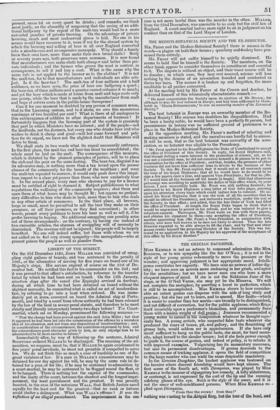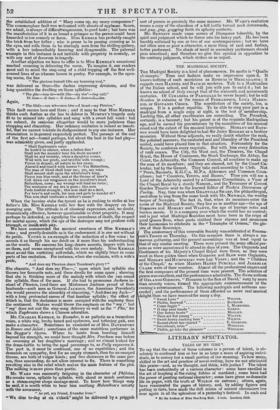THE GRECIAN DAUGHTER.
Miss KEMBLE is not an actress to command admiration like Mrs. gIDDONS, or to win sympathy like the fair O'NEIL ; if is not in the style of her young genius vehemently to move the passions or the wonder; and approving judgment is her appropriate meed. Intelli- tgence constitutes her capacity. We have seep an actress of loftier dig- 'nity ; we have seen an actress more endearing in her griefs, and apter for the sensibilities ; but we have never seen one who bore a more eloquent impress of mind. If she is not the Siddonian Juno of the stage, or the O'Neil Venus, she may yet be the Minerva. We will not complete the metaphor, by asserting a burst to perfection, which is still to be accomplished. Miss KEMBLE shows to how consider- , able an extent genius can dispense with the aids of long study and '.practice ; but she has yet to learn, and to amend. Her faults—which it is easier to number than her merits—are broadly to be distinguished, , and not difficult of correction, but for the public applause, which flings 1 itself invariably upon a performer's blemishes, and permanently fixes -them with a leaden weight of dullArai; JOHNSON recommended a yang writerlii cance m s composition whatever he thought espe- cially fine. A young artiste, who suspected false taste wherever she produced the roars of boxes, pit, and gallery, and the flourishing of greasy hats, would seldom err in apprehension. If she have only merit sufficient to hang on the public taste, she must, for hard neces- sity, adapt herself to the slender tenure; but if she feels power enough to guide it, the course of genius, and indeed of policy, is to rebuke it with improved examples. Vulgarizing has its momentary successes, but also its permanent disadvantages. If genius descends to the common means of tricking applause, it opens the field of competition to the large number who can wield the same despicable machinery. In the Grecian Daughter, the loudest applause was bestowed on the heroine where discreet friendship would have kept silence. The first scene of the fourth act, with .Dionysius, was played by Miss KEMBLE in the manner of objurgatory low comedy. A lofty abhorrence, or contempt, is not expressed by the curl of the lip and the cunning sidelong glance of the eye. Such is the style of the sneer, and it is not the sneer of well-conditioned persons. When Miss KEMBLE re- . plied upon Dionysius,
' From thee the crown! from thee I"
nothing was ranting to the Abigail fling, but the toss of the head, and the established- addition of " Mary come up, my saucy companion !" The commonplace fault was welcomed with shouts. of applause. Scorn, we admit, is always of difficultggexpression,to good taste ; bid here was the manifestation of it in as broad a grimace as the. persontoWd have hazarded in low comedy or farce. Miss KEMBLE has probably caught the trick from her father ; who is prone to be passing cunning as to the eyes, and rolls them to be starmgly seen from the shilling-gallery, with a leer indescribably knowing and disagreeable. The paternal example in this instance is not imitable with propriety in comedy, or with any sort of decorum in tragedy.
Another objection we have to offer is to Miss KEMBLE'S occasional marked scanning in delivering the verse. To imagine it, our readers must call to mind the sing-song of a child tripping off the first well- conned lines of an irksome lesson in poetry. For example, in the open- ing scene, the line
" The glorious tumult lifts my towering soul,"
was delivered as • thus—the dashes expressing divisions, and the long quantities the dwelling on those syllables :
"The glor—ious of—mutt lifts—my tow'—ring sock" Di dum— di dum— di dum— di dum—di—dee.
Again,
"The Gods—can wit—ness how—I laved—my Plocion."
This fault occurs here and there ; and it may be that Miss KEMBLE thinks such fustian us she has to deliver in MURPHY'S tragedy only fit to be minced into syllables and sung with a sweet full voice : but We submit, its omission altogether would be more judicious than Chopping and chaunting. Her ordinary recitation is indeed so beauti- ful, that we cannot tolerate its disfigurement in any one instance. Her enunciation is in general exquisitely perfect. The passage at the end of the first act—tumid perhaps, but about the best in the bad play— Was admirably given, and justly applauded.
"" Shall Euphrasia's voice Be hush'd to silence, when a father dies ?
Shall not the monster hear his deeds accurst?
Shall he not tremble, when a daughter comes, Wild with her griefs, and terrible with wrongs ; Fierce in despair, all nature in her cause.
Alarm'd and rous'd with horror ?—Yes Melanthon, The man of blood shall hear me; yes, my voice Shall mount aloft upon the whirlwind's wing, Pierce yon blue vault, and at the throne of heav'n Call down red vengeance on the murd'rer's head.
Melanthon, come; my wrongs will lend me force; The weakness of my sex is gone ; this arm Feels tenfold strength; this arm shall do a deed, For heav'n and earth, for men and gods to wonder at ! This arm shall vindicate a father's cause."
When the heroine stabs the tyrant as he is rushing to strike at her father's life, Miss KEMBLE veils her face with the drapery on her avenging:, arm. The attitude is of classical expression, and, no doubt, dramatically effective, however questionable in strict propriety. It may perhaps be defended, as signifying the sacredness of death, the respect for mortal agony, which the eye of the destroyer may not profane with triumph, or insult.with. pity:
We have commended the musical sweetness of Miss KEMBLE'S
voice; greatly desirable as is the endowment, it is one not without its perils. YoUNG is an example of the seduction of a fine voice : he sounds it as though his ear dwelt on it more than his understanding on the words. He caresses his long-drawn accents, lingers with love on them, and seems enraptured with his own melody. Miss KEMBLE must avoid this surfeiting self-relish, which we slightly trace in some parts of her recitation. For instance, when she exclaims, with a wife's pride,
"And does my Phocion share Timoleon's glory ?"
She chaunts, " And does my Pho—," upon which last syllable she throws her favourite note, and there dwells for some space ; showing that she is thinking more of the melody with which she can sound the syllable, than- of the man. If she had to pronounce Jackson in- stead of Phocion, (and there are Mistresses Jackson .proud of their husbands—such men as General JACKSON, the American President) she would perceive the absurdity of chaunting, " And does my Jack—" with a long protracted caress of that familiar syllable ; the effect of Mich is, that the declaimer is more occupied with the euphony than the sentiment. Nature would throw the emphasis on the " my ;" but " my" does not suit the sing-song delivery so well as the " Pho," for which Euphrasia shows a Chinese adoration.
Mr. CHARLES KEMBLE, in Evander, is as pathetic as a tremulous voice, a white wig, bushy beard and eyebrows, and tottering gait, can make a character. Sometimes he reminded us of Mrs. DAVENPORT in Romeo and Juliet; sometimes of the same matchless performer in the Beggar's' Opera. Where he • faints from boasting himself beyond his strength, we could have thought Mrs. Peachum was before us swooning at her daughter's marriage ; and we almost leoked• for the dram-bottle to bring the aged personage to, as Polly expresses it. The part is, it must be confessed, one of no capabilities ; and the demands on sympathy, first for an empty stomach, then for an usurped throne, are both of vulgar kinds ; and two distresses in the same per- son, thus succeeding, do not allow interest to fix. There is something revolting also in the relief which makes the main feature of the plot. The milking is more pious than poetic.
Mr. WARD was eminently fatiguing. in the character of Philotas. Be croaks verse, syllable by syllable, with about as much sentiment as a steam-engine chops sausage-meat. To know how things may be said, it is worth while to hear him soothing Melanthon's anxiety with the assurance, As yet, my friend, Evander lives."
" We dine to-day at six o'clock" might be delivered by a priggish sort of person in precisely the same manner. Mr. WARD'S recitation seems a copy of the elocution of a full bottle turned neck downwards, and gug, gug, gagging forth its splashy contents. Mr. BENNETT made some scenes of Dionysius tolerable, by the spirit and judgment which he threw into his heavy part. He has been harshly criticised by one or two of our contemporaries ; but we have not often seen so poor a character, a mere thing of rant and fustian, better performed. No shade of merit in secondary performers should pass unnoticed; and therefore we give this opinion in opposition to the contrary judgment, which strikes us as unjust.



















 Previous page
Previous page